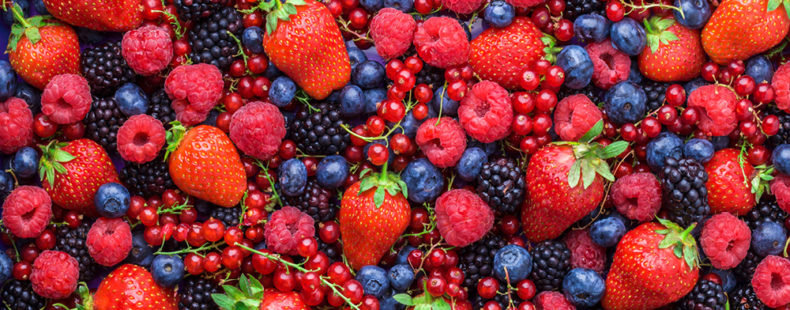The berry family is a linguistic invention particular to Germanic languages, like English. Other languages, like Spanish and French, do not combine the wide, diverse berry family into one group, but rather have very different words for blackberries, raspberries, blueberries, and strawberries.
Where does the word berry come from?
The word berry comes from the Old English berie, which originally meant “grape.” As the English language spread to the Americas with colonization, many native grape-shaped fruits that grew in bunches took on the berry suffix: blueberry, cranberry, elderberry, etc. Though the many small, delicious fruits known as berries were grouped together in a linguistic accident, they are in fact many biologically distinct plants and fruits.
A botanist would probably tell you that grouping berries together is about as accurate as calling dolphins, tadpoles and squid “water creatures.” True berries are simply fruits in which each fruit comes from one flower, like blueberries. Even cucumbers and tomatoes are technically berries! Botanically speaking, blueberries (Latin family: Ericaceae) are more closely related to rhododendrons than they are to raspberries.
Are strawberries really berries?
Strawberries (Latin family: Fragaria) are called accessory fruits by botanists because they grow from parts of the plant other than the flowers. Raspberries and blackberries (Latin family: Rubus) are another example altogether. They are called aggregate fruits because their flowers form drupelets instead of one whole fruit. Drupelet is the technical word for the individual morsels of blackberries and raspberries. Fruits in the Rubus family are also called bramble fruits because they grow on spiky bushes.
Is a grape a berry?
Grapes, by the way, are technically berries. But where did the word grape come from? In Old English grapes were called winberige, literally “wine berry.” The word grape comes from the Old French word graper, which came from the word krappon, the hook used to pick grapes. In English, the tool became synonymous with the fruit in 1300s. (What other food words have morphed in weird ways? The history of the “hot dog” may gross you out, and the origin of egg is not to be missed.)
Luckily, the erroneous linguistic grouping of “berries” gave us great treats like mixed berry ice cream, which may confuse botanists and non-Germanic language speakers.














